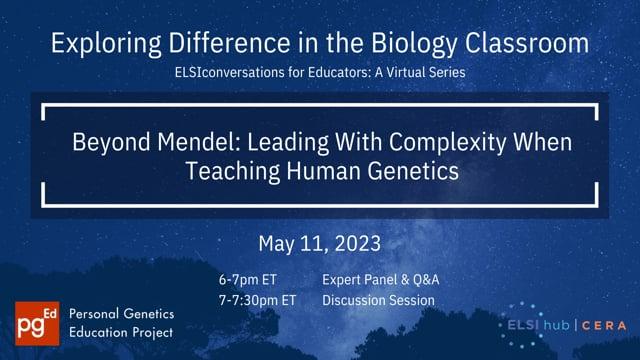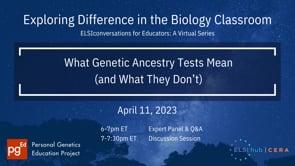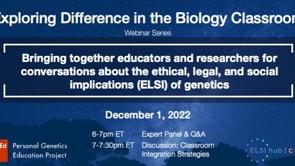Exploring Difference in the Biology Classroom: Engaging with Genetic Disability and Difference
Date: March 8 2023, 3-4 pm PT / 6-7 pm ET
Language in biology and medicine can frame disability as a deviation from what is normal, acceptable, and welcome - a framework that can extend into classrooms. However, importing terms like "disorder" or "mutation" from these fields can reinforce assumptions that disabled people are less capable, less valuable in society, and less independent compared to people without disabilities. What ideas or messages are we sharing in our language about biological differences? Reflecting on this question is the first step toward addressing barriers to student engagement, preventing potential harms, and creating more inclusive classrooms.
In this session, two leading disability scholars will provide an introduction to the evolution of disability language, discuss current trends, share insights from their work in clinical settings, and identify practices that can support inclusive education and engagement around disability and difference. The program will focus on evidence-based, pedagogical approaches that affirm the dignity, humanity, and agency of disabled and neurodiverse people and support them to learn, grow, and flourish.
Presenters: Kara Ayers, PhD & Joel Michael Reynolds, PhD
Co-Moderators: Rob O'Malley, PhD & Marnie Gelbart, PhD
Suggested citation:
Ayers, K., Reynolds J. M. & O'Malley, R., Gelbart, M. (2023, March 8). Session 2: Engaging with genetic disability and difference [Video]. The Center for ELSI Resources and Analysis (CERA). https://elsihub.org/video/exploring-difference-biology-classroom-engaging-genetic-disability-and-difference
Please find the transcript, additional resources, and the presenters' slide decks in the upper right hand corner of this page.
Tags
Videos in Series
-

ELSIconversations 4: Exploring Difference in the Biology Classroom - Exploring Complexity in the Biology Classroom: Beyond Mendel: Leading with Complexity when Teaching Human Genetics
-

ELSIconversations 4: Exploring Difference in the Biology Classroom - Exploring Difference in the Biology Classroom: What Genetic Ancestry Tests Mean (and What They Don't)
-

ELSIconversations 4: Exploring Difference in the Biology Classroom - Exploring Difference in the Biology Classroom: How to represent wide-ranging family structures and personal identities using the latest pedigree nomenclature
